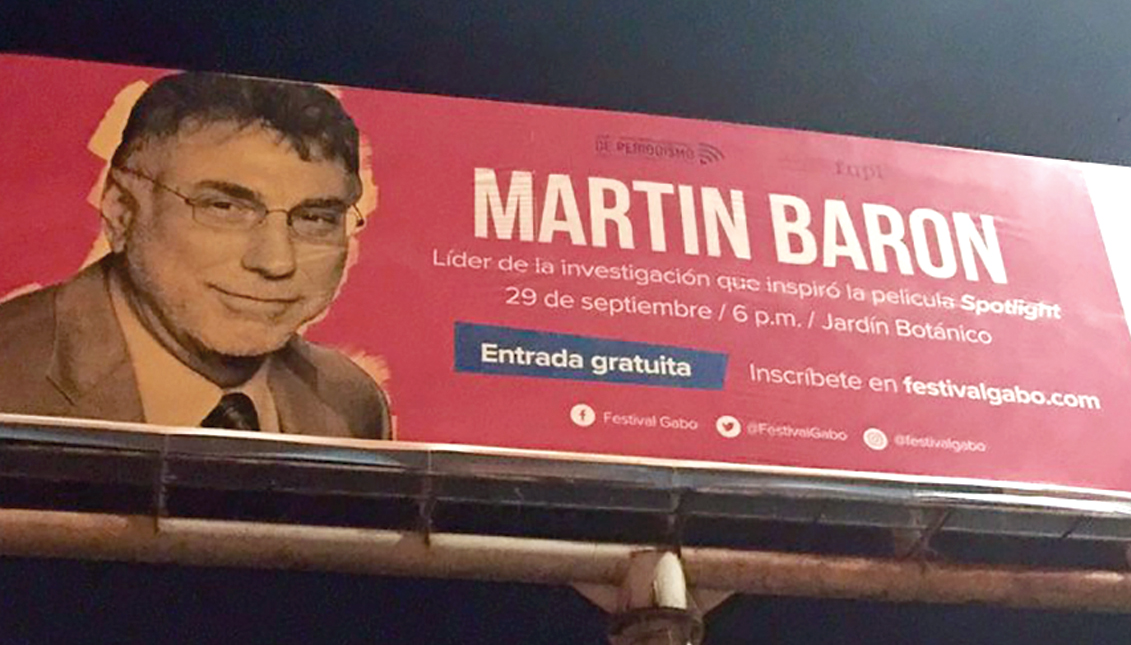
[OP-ED]: Washington Post’s Editor “Spoke With Sharp U.S. Spanish” in Medellín
MORE IN THIS SECTION
Under Martin Baron leadership, the Post has tackled with great success the odds of the digital era, surpassing in unique views the once unbeatable New York Times
With a written translation into Spanish of his speech at hand, Martin ‘Marty’ Baron, the current Executive Editor of the Washington Post, thundered “en Español” some truths of our profession, the one Saint Augustine called the "Vendor of Words" occupation.
Loud and clear Baron spoke in Spanish through his cute U.S. English accent from Tampa, Florida, where he was born, pronouncing the Mediterranean “Rs” with almost no glitches to hundreds of the best Spanish-language writers and intellectuals from Latin America and Spain gathered last week in Medellín, Colombia, for the “Festival Gabo” of the “Fundación de Nuevo Periodismo Iberoamericano (FNPI),” founded in 1994 by deceased Colombian Nobel Prize writer Gabriel ‘Gabo’ García Márquez.
Baron is one of the best known journalists of our time— not only because of his ample personal merits, which includes a decent command of the second language of the United States (sí, el Español), infrequent among all his predecessors...
Baron is one of the best known journalists of our time— not only because of his ample personal merits, which includes a decent command of the second language of the United States (sí, el Español), infrequent among all his predecessors, and also a meteoric career that has taken him from the Miami Herald, then to The Los Angeles Times, The New York Times, The Boston Globe and, since 2013, to The Washington Post.
Wherever he goes now, Baron is immediately associated with the Oscar-winning movie “Spotlight,” in which he is, not the main actor, but, even more famous than his artistic impersonator, he is the main character himself.
Actor Liev Schreiber plays Martin Baron's role masterfully in the movie, improving, I am sure, the original for the credulous viewers, who are so willing to believe the riveting story of how Baron and a handful of brave journalists at the “Globe” forced the influential Catholic Church of his city to confront publicly the unspeakable sins of some of his leaders— and pay dearly for it.
Listening to his speech —“too long,” told me professor Rosenthal Alves, former Brazilian Editor and Director at Knight Center for Journalism in the Americas at the University of Texas— Baron spoke nevertheless persuasively on multiple fronts (see complete Spanish-language text here), most powerfully for me when he defined what he called “La Marca” (the brand), in the case of his current employer, the authentic brand of journalism called The Washington Post, built over landmark battles of American Journalism such as “Watergate,” yet another episode of the profession eulogized by the classical movie “All the President’s Men.”
Under Baron leadership, the Post has tackled with great success the odds of the digital era, surpassing in unique views the once unbeatable New York Times, leveraging the resources provided by the new owner, the son of the Cuban American immigrant Miguel Bezos, the famous Jeff Bezos, the man who built Amazon out of his garage in Seattle, and now with a personal net worth calculated today in over $72 billion.
Bezos paid for that “Post brand,” just $250 million. Almost like “¢25, or a quarter of a dollar,” from the perspective of that personal fortune the amazing Amazon garage's experiment has given him.
Mr. Bezos obviously bought the value of the brand, that brand name built by people who live no more, like the memorable Benjamin C. Bradlee, Editor, or Katharine Graham, Publisher, during the memorable "Watergate" years.
More than the Post historic building featured in the movie “All the Presidents Men,” which they vacated for a more modern physical plant in DC, or the printing plants and equipment, which the new ownership must have considered junk and replaced by now, or the personnel, which they are constantly reorganizing with more engineers and digital reporters, Mr. Bezos obviously bought the value of the brand, that brand name built by people who live no more, like the memorable Benjamin C. Bradlee, editor, or Katharine Graham, publisher, during the memorable "Watergate" years.
Baron called “the brand” in his speech “el alma” (the soul), and the “brújula” (the compass).
The one without which the team and his leader will be lost, he said.
“De manera más apropiada puede describirse como nuestra alma,” he said, in tender Spanish.
“Es nuestra brújula.. (it is our compass..),” he added, sounding humble.
“...If we lose it, we will get lost,” he concluded, speaking his Spanish with American assertiveness.
But in Spanish, for those of us for whom that wondrous language is our mother tongue, the sentence lingered a bit longer while we were listening to him saying, sounding almost poetically, despite his dry English accent:
“Si la perdemos, nos perderemos...”






LEAVE A COMMENT:
Join the discussion! Leave a comment.